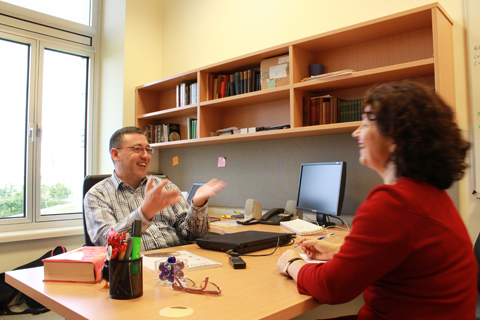Lanfranco Aceti: “As an academic, what you can do for yourself is limited. Life may be short, but your legacy in an institution can live on. My purpose is to give more power to my students, to empower them.”
When our Secretary-General Haluk Bal found out that I was going to interview you, he shared an impression of you: he said that, during the preparations for ISEA2011, you managed to get what you want within our outside the university thanks to your assertive and positive personality, that you did not take no for an answer and never stopped smiling or trying, even when faced with difficulties. And this was ony months after you had come to Turkey and Sabancı.
It is great to hear these from the Secretary-General, and important to me as an academic. There are things that Sabancı University wants to do. Institutions have much longer lives than the people in them. Together with your institution, you have personal ideals, conceptions about how you want the world to be, and you strive towards these. As an academic, what you can do for yourself is limited. Life may be short, but your legacy in an institution can live on. Right now, Sabancı University needs to encourage young students to go abroad, be involved in international work, and make a contribution when they come back here. Therefore, my purpose is to give more power to my students, to empower them. I like to support my students and lead them in this direction. I think we should have a doctorate program in visual culture in our faculty – as far as I know, there are no such programs in Turkey. This would have the added benefit of attracting students who will work with us for a long time.
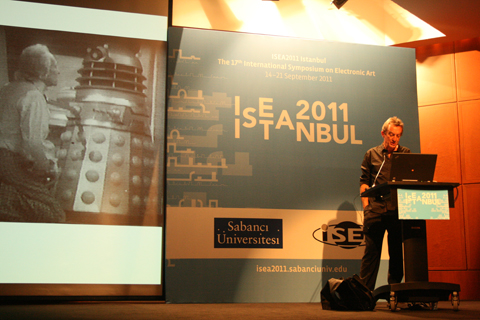
Why did you choose Sabancı University?
It was somewhat a coincidence. I had a Turkish friend at Central Saint Martins in England. We had known each other for a long time, so when this position was announced he asked me if I would apply. Actually it was funny because first he asked if I had a problem with Turkey. I said, “Good weather, good food, city by the coast, what problem could I have?” He said, “Well, you know the situation there is a little tense,” probably referring to the Islamic tradition and religious factors. I said, “We’ve known each other for 10 years, did we ever have any issues between us?” to which he responded no, and then I said “Then why should I have a problem with your country?” and decided to apply. I was offered the job and I moved here.
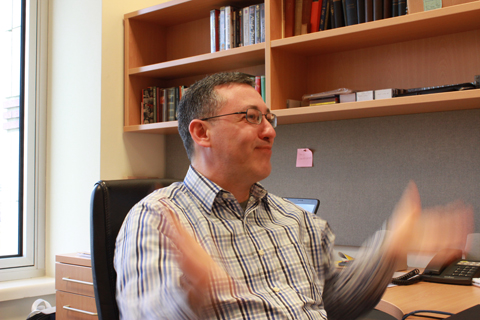
There is one more thing: they say that you need to have friends in critical places to succeed in Turkey. Funnily enough, I knew no one here, I had no family, no connections, and I applied without pulling any strings, and I was accepted. I know from Italy that it’s not what you know, it’s who you know there. Here I noticed that if you work hard, you are indeed given the opportunity to get what you want, as Haluk said, and that is what I did: I worked hard and got what was rightfully mine. There is a saying in Italian: Perspiration remains. If you make a real effort to do something, if you sweat and toil over it, you will be left with a permanent skill or capability. You could reach places through your influential friends, but it won’t take you far. When you learn something by cutting your teeth on it, no one can take away your knowledge and experience; those will stay with you for the rest of your life.
That is some important gain.
It is, indeed.
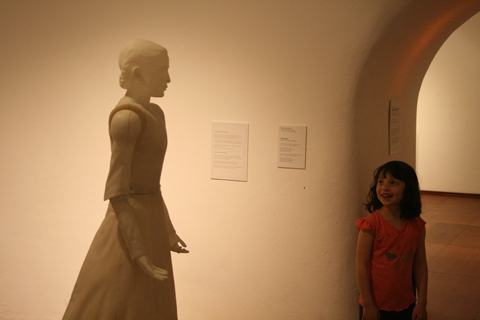
You were born in Italy, you went to school partly in Italy and partly in the UK, you started your academic career there, and now you continue in Turkey. What are your impressions of these three countries on education, customs and other aspects?
I went to university in Urbino, Italy, which I loved. It is a medieval town with a great museum and a lovely piazza. One of the exhibits in the museum was Raphael’s “La Muta,” and I would spend hours viewing it. University buildings were scattered around town. The town had two hills and there were two lecture halls on those hills, so I had to run right through the town in the ten-minute recess between classes to make it to the next one. Charging up and down the hill every day had given us huge leg muscles. If you had nothing to do in town, you could just sit in the piazza and watch students run to and fro; it was fun!
My life in England was much different. I loved the view there – the leaden sky and green surroundings. Green in England is deep and bright, I loved that. One of the things that I noticed the most was strict compliance with the rules. You had rules about how to do a certain thing, and everyone would abide by that. I was very comfortable working there because I knew exactly how everything was supposed to be done – that was not the case in Italy. I had my favorite places there, like the botanical gardens, galleries, art institutions, and museums like the National Portrait Museum and Tate Modern. There is no shortage of artistic activity there. Now we work with some of the world-renowned institutions in the UK for things we do at Kasa Galeri. We collaborate with the Royal College of Art and Goldsmiths' College to take Kasa Galeri to an international platform.
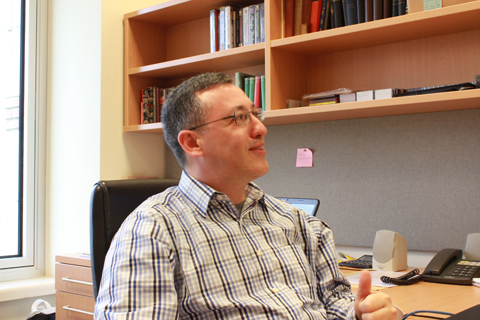
As for students at Sabancı, those who take the museums and contemporary art courses this year start to learn what it means to be a curator, how much research a curator has to do to create an exhibition. I want my students to be aware of these.
Can you compare Italy, UK and Turkey for student behavior?
Students are students; there isn’t much difference between them. Class participation does differ though; some countries have different customs. It is important for students to know how to discuss things among themselves or with the lecturer. My students have begun to learn how to take permission to speak, when to intervene, how to discuss. This might be the difference in America, England or Canada – some classes are quieter, some have more class participation. There are distinct differences in Italy as this has to do with tradition. We had to learn Classic Greek and Latin in high school. We had a teacher whose desk and chair would sit on a high platform so she could see us like the omniscient eye of God. She would call us to the desk one at a time and do an oral exam for one hour. I’ve seen easier police interrogations! She would open a Greek or Latin book, cover the translation and tell us to translate the page. She would ask us who the author was and what his other works were; she could pick a word and ask about its grammatical properties… And during all this time she would be sitting so high that we could barely see the top of the desk.
Sounds quite imposing. What courses do you give here?
I give visual culture, new media, museums and contemporary art classes. I have my dissertation students as well.
Thank you for this conversation, Lanfranco.
